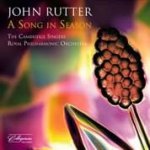John Rutter and his Cambridge Singers are back, and this will definitely please fans of both composer and choir. The reason: the generous (77-minute) program consists entirely of some of Rutter’s “more recent sacred pieces”, commissioned or suggested by various cathedrals, guilds, charities, Cambridge University choirs, and even the Worshipful Company of Barbers, whose membership Rutter explains “consists mostly of surgeons.” The opening and closing numbers–a Jubilate for Wells Cathedral and a Te Deum for Winchester–with their use of brass, timpani, percussion, and organ, show Rutter at his best in this exuberant, celebratory style.
Throughout is a mixture of very familiar Rutter-esque pieces (think, For the beauty of the earth, or There is a flower, or even What sweeter music) interspersed with some uncharacteristic works, such as the very Walton-like, a cappella The King of Blis, or Veni Sancte Spiritus, written for the special acoustics of the chapel of King’s College, Cambridge, and of course for the exceptional abilities of its resident choir. In this piece Rutter not only ventures into harmonic territory he doesn’t usually explore, but its through-composed conceptualization and inspired treatment of text (and very effective orchestration) makes you long for more of this side of a composer who obviously knows the market while holding to very honorable musical values.
You can’t help but be reminded of Benjamin Britten’s opening horn solo for the Serenade for Tenor, Horn, and Strings when you hear Rutter’s trumpet-solo opening to the very substantial anthem Lord, thou hast been our refuge, commissioned by the above-mentioned “Barbers” for a performance in St. Paul’s Cathedral; the following piece, I am with you always, was written for the 900th anniversary of the composer’s local cathedral, Ely, an architectural gem and a marvelous setting for choral singing, whatever the music or occasion. And speaking of gems, this must be one of Rutter’s most fundamentally beautiful creations from the the past five or ten years.
Of course, the singing (recorded at London’s All Hallows’ Church, and, for two selections, in Henry Wood Hall) is sure, confident, and, we can be certain, absolutely consistent with the composer’s vision. Organist John Birch lets us know he’s there, but only because his playing is rock-solid and tastefully supportive of the choir and various combinations of instruments. The whole production, from programming to performances to sound quality to packaging bears the trademarks of excellence we’ve come to expect from Rutter and his recording/producing team over the years. Highly recommended. [3/08/2011]
































